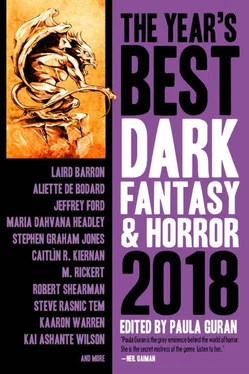But it didn’t come. For weeks after, all throughout the Christmas break, whenever I heard Trump’s name it was as if there was a loud gong echoing in my head. My feed was filled with anguish, betrayal, heartbreak. But I had seen all that already. I felt immured, resilient—and besides I still didn’t believe, not really, that it would happen. Then eventually the cold hard truth settled in when I watched the inauguration with Luca. As Trump walked to the podium I burst out laughing, I don’t know why, the sheer cognitive dissonance of the whole thing. I felt hysterical. My palms were sweating.
Afterward I learned St. John had written a novel about something similar, Answering the King , about a madman who cheats his way to becoming the President of the United States. Eventually it comes down to a fifteen-year-old girl tormented with visions of the past and the future to stop him. The question at the heart of it is: if you could go back in time to stop Hitler, would you? They had made a movie about it with Steve Buscemi. I don’t remember who played the girl, only how wide her eyes were, how she captured that world-weariness so well for someone so young. She was a Cassandra. No one would listen to her.
That was the night when the whole thing with Luca happened. Normally we were very careful. I hadn’t been in my job for very long and he’d just moved across the country to live with me. We had talked about having kids one day but… We weren’t careful enough. Disaster crept in the way it always does.
I called Argo the next day. It was the first time I’d spoken to her and her voice was thin and cagey with a flat Ohio accent. It sounded as if it were coming away from much further away than the Upper East Side.
It felt strange to be listening to her voice and I thought about what Dylan Bone had told me. I’d read the obituary in fact, half as a joke and half because I knew Dylan didn’t make mistakes very often. He’d cut his teeth in the eighties horror boom and still made most of his money by convincing writers like St. John and Clive Barker to give him new material. It might sound mercenary but it isn’t, not really: Bone was a believer, a horror fanatic. He loved the stuff and even when the market dropped out of it in the nineties he had kept at it, putting out anthology after anthology with cheesy hand-drawn skeletons or zombified hands reaching out of the grave. Argo had been part of that, someone who’d made the genre in its heyday.
One the phone Argo was polite and she agreed to meet me for lunch the next day at a cafe. “It’ll have to be close to my apartment,” she told me, “I can’t move very well now.”
I told her I understood, and could meet her wherever she wanted.
“What’s this about then? Really?” Her tone wasn’t querulous, but wondering. “You know I wrote a chapter about working with St. John for some anthology twenty years ago, Devilish Discussions or something like that.”
I hesitated because I didn’t really have an answer. Yes, I knew the story about how she’d been sent St. John’s first manuscript by mistake. It had been meant to go to her boss but he’d been on vacation. She’d liked it but her boss wouldn’t touch it, and she didn’t have enough support inside Doubleday to push it through, not then, a low-level assistant. But they’d kept in touch, writing letters when the mood took one or the other. Then when Rosie had come along it had been “a day of glory”—so she called it.
I gave her the answer I gave most of my colleagues. St. John had changed the genre, really changed it. For one brief moment horror hadn’t been the red-haired stepchild of fiction. Horror had been king . And I wanted to know how that had happened. Part of my answer was true. I’d always been fascinated by the way books were made, the countless decisions that went into them. But if I were really honest it was simply because I’d become a fan, a real fan—maybe not Dylan Bone level—but my admiration for St. John was genuine.
It was more than that though. The real reason was one I couldn’t quite put my finger on, but it had something to do with stories of chance—which St. John’s certainly was. And that underneath every story is a pivotal moment when things changed. I wanted to know what that looked like. I needed to know if Argo had understood when that manuscript crossed her desk what it would mean, if she’d felt a chill when he opened the envelop. Like someone had walked on her grave.
That afternoon Benny took me out to the Cloisters for old time’s sake, and it was beautiful, just like he’d promised it would be. The place was a mishmash of architecture taken from a series of medieval abbeys in France, Catalan, and the Occitan, simultaneously peaceful and surreal, liminal, a sliver of another world transplanted into New York.
“I thought you’d like it,” Benny told me. We were staring at a tree that had been shaped to fit one of the alcoves in the garden. Its branches curved unnaturally like a menorah to fill the space. I couldn’t help but wonder how it had been manipulated, what sort of subtle violence had pressurized the wood to assume the shape it had.
“I do,” I told him, shivering despite the mid-day heat.
“So, tomorrow. The editor, what’s her name again?” He snapped his fingers. “Argo, right? Lily Argo. You’re going to interview her. What about St. John then? Any chance you’ll get to speak to him?”
I didn’t think so. St. John lived in New Hampshire and I had no idea what kind of relationship the two of them still had. If they kept in touch. If Argo would even like me.
“Of course she will. You’re—well, you’re the makeles quene , aren’t you?” He smiled. “You are without blot.”
“Someone back home said she was dead,” I told him uneasily. I still didn’t like that part of the story. Why would Dylan have thought that?
“Huh,” Benny said. “It sounds like the beginning of a ghost story, doesn’t it? Like she’ll bestow her wisdom on you, settle her unfinished business, and vanish into the night.”
“It sounds exactly like that.”
“But maybe you’re lucky, not seeing St. John.”
I asked him what he meant.
“You know. He’s bound to be pretty weird, isn’t he? I mean he’s been writing that stuff for more than forty years now. You can’t keep that close to the darkness without some of it sticking to you.”
It wasn’t the first time I’d heard something like this before. I was used to getting it myself sometimes at the university. But the horror writers I’d met were among the most well-adjusted people I knew, certainly they were much calmer than the other writers I tended to deal with. Some people said it was because there wasn’t much money in horror writing these days. But I thought it was something else: writers were good at channeling their anxieties into something productive. We all have those nasty thoughts, those worries that maybe we don’t love our partners as much as we should, or maybe they don’t love us. Fears that maybe something awful will happen tomorrow. The phone will ring and it will be the police. An accident somewhere. Or a fight escalated, a button pushed.
“When I studied the Middle Ages,” I told him, “it always seemed like it must have been so difficult for those people. I mean, the Black Death wiped out forty percent of the population. Imagine whole villages lost, your family—everyone you’ve ever met—wiped out.”
“I know,” he said, “I just couldn’t take living like that. I’d, I dunno. I’d go crazy, I guess.”
I wondered if he really would go crazy. Or if he was going crazy right now, waiting for that call about Emmanuel. Waiting for Trump to finally get around to signing a new Executive Order. I had always liked Benny because he had a sense of outrage, a keen abhorrence of injustice. I knew he had marched in those early protests and knew that he wasn’t marching anymore. He didn’t want to draw attention to himself. Benny was strong but he was adaptable. He was finding ways to survive, to keep marking his art—but doing it so it didn’t hurt Emmanuel.
Читать дальше












